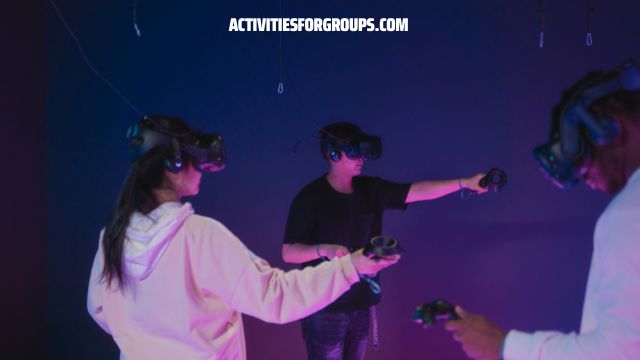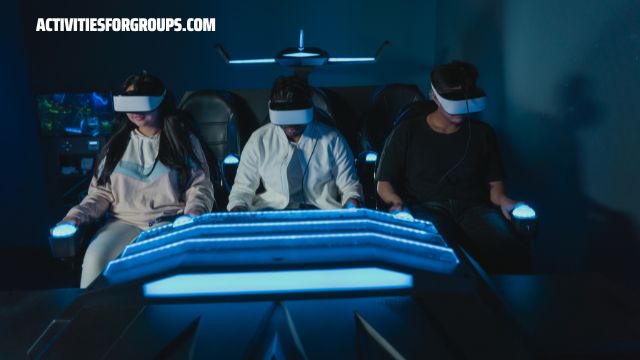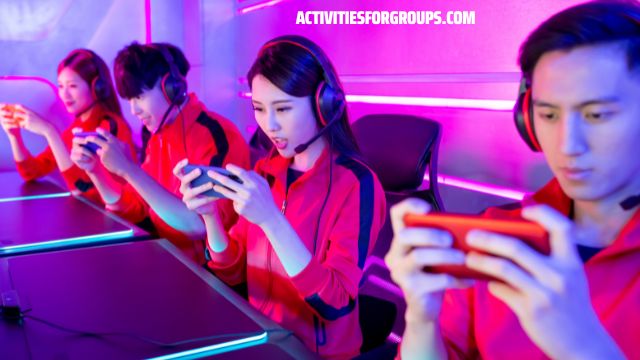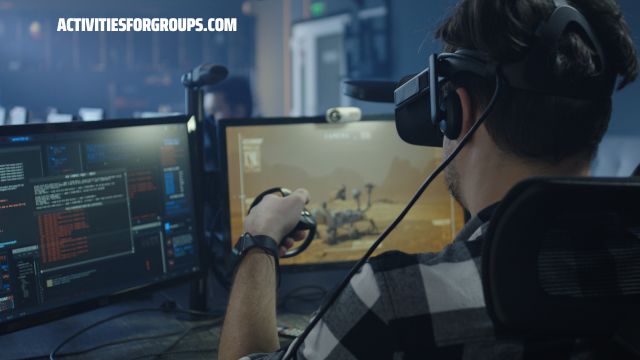Role-playing and simulation games are some of the most versatile activities for groups. Not only do they provide an opportunity to have fun, but these games also allow participants to learn important skills such as problem-solving and creativity.
As an experienced group activities organizer, I can tell you that there’s no shortage of ideas when it comes to planning a successful group activity.

In this article, I’ll be exploring some great role-playing and simulation game ideas that will keep everyone entertained!
From classic board games to virtual reality simulations, there is something to suit all types of groups. Whether you’re looking for team-building exercises or just want a way to pass the time with friends, role-playing and simulation games offer endless possibilities. These activities require minimal equipment while providing hours of entertainment – perfect for any occasion!
But where should you start? Don’t worry; I’ve got you covered! In this article, I’ll be discussing creative ways to use existing materials from around your house or classroom.
You don’t need expensive tools or gadgets to get started – just open up your imagination and let the fun begin! So grab your supplies, gather your troops, and prepare yourself for an adventure like no other – because with my tips on role-playing and simulation game ideas for group activities, anyone can join in on the action!
Related Article: Top Group Activity Ideas For Building Trust Among Team Members.
10 Role-Playing And Simulation Games Ideas For Group Activities
| Activity | Preparation | Contribution |
|---|---|---|
| 1. Murder Mystery | Prepare a script and assign characters to each participant. Provide clues and opportunities for participants to solve the mystery. | Participants use problem-solving and deduction skills, as well as practice teamwork and communication. |
| 2. SimCity | Set up a simulation game where participants must build and manage a city. | Participants practice decision-making, problem-solving, and collaboration skills. |
| 3. The Stock Market Game | Participants are given a set amount of fake money to invest in stocks. | Participants practice critical thinking, decision-making, and risk assessment skills. |
| 4. Crisis Management Simulation | Create a scenario where participants must work together to manage a crisis, such as a natural disaster or a workplace emergency. | Participants practice decision-making, problem-solving, and communication skills in a high-pressure environment. |
| 5. Dungeon Master | Participants create characters and embark on a role-playing adventure. The game master (or dungeon master) sets up the story and obstacles for participants to overcome. | Participants practice teamwork, communication, and decision-making skills while having fun in a fantasy setting. |
| 6. Project Management Simulation | Participants are given a project to manage and must make decisions about resources, timelines, and budget. | Participants practice project management skills, including planning, risk assessment, and communication. |
| 7. Business Strategy Game | Participants create and manage a business in a simulated market. | Participants practice strategic thinking, decision-making, and collaboration skills. |
| 8. United Nations Simulation | Participants represent different countries and work together to solve global issues, such as poverty or climate change. | Participants practice diplomacy, negotiation, and communication skills while learning about global issues. |
| 9. Courtroom Drama | Participants take on roles in a mock trial, including lawyers, witnesses, and jurors. | Participants practice critical thinking, problem-solving, and communication skills while learning about the legal system. |
| 10. Historical Reenactment | Participants research and reenact a historical event, such as a battle or a diplomatic negotiation. | Participants practice research, critical thinking, and communication skills while learning about history. |
Definition
Role-playing and simulation games are popular forms of group activities. They involve the participants in creating their own unique characters, stories, and scenarios that evoke emotions in all involved. To define role-playing games can be described as an interactive narrative experience where each participant acts out their character’s part.
On the other hand, simulations provide more realistic experiences with real-life situations that the players must resolve together.
Both types of games require problem-solving skills and creativity while giving players different ways to explore these various challenges.
Doing so encourages collaboration between members of the group as they strive to reach a common goal. Without a doubt, role-playing and simulation games offer many benefits when used for group activities; this will be discussed further in the next section.
Benefits Of Role-Playing And Simulation Games

Role-playing and simulation games offer a wide range of benefits to groups engaging in these activities. Not only do they provide an opportunity for individuals to take on different roles, but they also allow players to gain insight into their own characters as well as the others within their group.
Role-playing games encourage team building, problem-solving, and collaboration while allowing participants to use creativity when planning scenarios. Simulation games further challenge users by giving them an environment where they can make decisions based on real-life situations.
The most notable benefit that role-playing and simulation games have is the ability to develop character skills such as empathy, communication, trust, and leadership. As players explore different scenarios, they are able to build relationships with each other which leads to better understanding when working together in any given situation.
Additionally, this form of gaming helps individuals become more aware of how their choices affect the outcome of every decision made during gameplay. This type of learning reinforces good behavior while providing a safe space for mistakes without consequences outside of the game itself.
In addition to developing character strengths, role-playing and simulation games also provide opportunities for creative expression through scenario development. Players get a chance to craft stories using story elements like setting, conflict resolution technique, etc.
while exploring themes related to specific topics or issues present in our world today. Through this process, teams learn valuable problem-solving strategies that will help them tackle similar issues in real-life settings with confidence and skillful execution.
Overall, role-playing and simulation games offer numerous benefits that can be carried over into everyday life experiences; making them one of the best options available for group activities aiming at personal growth and development!
Types Of Group Activities
Group activities that involve role-playing and simulations can be incredibly effective for team-building, problem-solving, and collaboration. These types of activities have become increasingly popular with teams from all backgrounds in recent years. From board games to outdoor activities, there are a wide variety of options available for groups looking to engage in these fun and interactive experiences.
An easy way to get started is by trying out some group-building exercises such as trust falls or balloon popping which require cooperation between participants. Problem-solving tasks like puzzles or mazes also create opportunities for people to work together while having fun at the same time.
Collaborative games such as charades can help build team spirit and encourage communication skills among players. Alternatively, board games provide an opportunity for everyone involved to strategize their moves and interact with each other. Finally, outdoor activities are great ways to explore different environments while learning about teamwork and critical thinking through real-life scenarios.
Role-playing and simulation games offer exciting opportunities for groups to learn more about themselves as well as each other.
By choosing the right type of activity for your team, you can ensure that everyone will gain something meaningful from it. With careful planning ahead of time, these experiences can turn into powerful tools for teaching important lessons on working together effectively.
Planning Considerations
When planning role-play and simulation games for a group, there are several considerations to keep in mind.
- Activity Selection: It is important to select activities that will engage the participants while also being age-appropriate. The activity should be something that everyone can agree upon, as well as keep within the comfort level of those participating.
- Group Dynamics: Take into account the makeup of the group when selecting an activity or game; this includes different ages, genders, and levels of experience with role-playing and simulation games.
- Safety Protocols: Before beginning any game it is important to go over safety protocols such as how long each session should last and what techniques could be used if someone becomes uncomfortable playing or needs to take a break from the game.
- Role-Play Planning: Consider setting boundaries on the type of language used during the course of play, as well as making sure all players understand their character’s objectives before starting the game.
By taking these factors into consideration prior to engaging in role-play or simulation games, groups can create an enjoyable environment where everyone feels safe and respected while having fun at the same time.
With careful thought put into these aspects beforehand, everyone involved can look forward to experiencing an exciting adventure together! Moving on then, let’s explore developing characters and scenarios for our upcoming game sessions…
Character And Scenario Development

Once the planning considerations are taken care of, it’s time to start developing characters and scenarios for a role-playing or simulation game. Character building is an integral part of creating an immersive experience for players in any type of game. The following table provides some ideas on how to get started with character creation:
| Character Building | Role-Playing Scenarios |
|---|---|
| Create Character Backstories | Create Storylines and Plots |
| Develop Character Archetypes | Develop Goals and Outcomes |
| Design Mini Adventures | Add Conflict to the Game |
Creating believable backstories can help bring out more depth in each player’s character while also helping them create their own identity within the game.
Utilizing archetypes helps simplify this process by providing pre-defined roles that have different sets of motivations and goals. Additionally, designing mini-adventures allows players to have smaller objectives throughout the course of play which keeps things interesting and dynamic.
These mini-stories should include conflict elements so that there is something at stake during gameplay as well as provide chances for rewards along the way.
With all these components in place, you’ll be ready to launch your next great adventure! Supplies and equipment needed will depend heavily on what kind of game you’re playing and where it takes place.
Supplies And Equipment Needed
Role-playing and simulation games can require a variety of supplies and equipment to provide an immersive experience. According to the Entertainment Software Association, 64% of Americans play video games regularly.
To create a successful activity for groups, it is important to have the correct materials on hand. This section will discuss some necessary items when setting up role-playing and simulation games including costumes, props, gaming boards, miniatures, and dice.
Costumes are essential in creating an enjoyable gaming atmosphere as they help players become fully immersed in their characters within the game world.
Depending on the type of game being played, participants may need special themed apparel such as medieval or science fiction clothing. Additionally, accessories like hats, masks, or gloves could be used to accentuate each character’s unique look.
For many role-play activities that involve physical movements throughout a playing space, common props might include fake weapons or similar objects needed to advance through levels of the game. Props can also incorporate more realistic elements such as treasure chests with coins for pirate adventures or glow sticks for nighttime quests.
Gaming boards allow gamers to visualize their journey during gameplay by using figurines along certain pathways with predetermined points of interest marked out before beginning play. Miniatures come in various sizes from small figurines made out of plastic to larger models crafted from metal or resin which can take considerable time and effort to paint accurately if desired.
Dice are utilized in most tabletop RPGs (role-playing games) where numbers indicate how much damage has been done by attacks or what kind of outcome occurs when performing certain actions within the game’s universe.
Having all these pieces readily available ensures a smooth flow while running group activities involving role-playing and simulation games. With adequate preparation beforehand, everyone involved will have fun while engaging in its exciting possibilities! Going forward we’ll explore sample activities suitable for different age groups so your next gathering will be a sure-to-hit!
Sample Activities For Different Age Groups

Role-playing and simulation games can be a fun way to engage different age groups in group activities. When planning activity ideas, it’s important to consider the interests of each age group. Here are some examples of role-play scenarios, simulation games, and other engaging activities that can be tailored for various ages:
Age 5 – 8
- Create an imaginary world with block castles and villages
- Engage in pretend play such as pretending to be superheroes or pirates
- Play charades or Pictionary
Age 9 – 12
- Participate in mystery-solving adventures or scavenger hunts
- Hold debates on current events topics
- Host mock trials where kids take turns acting as lawyers, jurors, witnesses, etc.
Age 13+
- Compete against one another on trivia questions about history or pop culture
- Design their own versions of board games like Monopoly or Settlers of Catan
- Utilize strategy skills by playing complex card games such as Magic The Gathering or UNO
Before beginning any game or activity, it is essential to review safety protocols and ensure everyone understands the rules. Establishing these guidelines helps keep players safe while allowing them to enjoy themselves without worrying. With proper preparation, your next role-playing or simulation game will undoubtedly be a success!
Safety Protocols
Moving right along from the previous section, let’s talk about safety protocols for group activities. When it comes to role-playing and simulation games, creating a collaborative protocol is essential in order to ensure that everyone feels safe and comfortable participating. This means establishing clear rules of engagement as well as procedures for addressing potential risks or issues.
It is important to create a safe environment for all participants by ensuring there are appropriate risk management strategies in place. This could include using protective gear such as helmets or other protective equipment depending on the activity. It is also important to provide safety precautions when necessary such as having an emergency plan or providing first aid training if needed. All these measures will help make sure everyone is kept safe during the game.
To sum up, proper safety protocols should always be taken into account when designing role-playing and simulation games for groups. By setting clear expectations and providing adequate protection, you can guarantee a fun and rewarding experience for all involved – without putting anyone at risk!
Frequently Asked Questions {FAQs}
What Are The Best Ways To Engage Participants In A Role-Playing And Simulation Game?

Engaging participants in role-playing and simulation game is an art form that requires creative thinking, problem-solving, and understanding of group dynamics.
If you want to truly captivate your audience with an interactive story, then these tips are sure to make it a success! From setting the scene to choosing suitable characters for each player, there’s so much potential for creating unforgettable experiences. Here are some of the best ways to engage participants in a role-playing and simulation game:
- Make sure all players understand their roles – Each participant should have clear instructions about how they fit into the storyline. This will help them get involved quickly without any confusion or frustration.
- Encourage collaboration between players – Group activities require cooperation and coordination from everyone taking part. By encouraging communication between players, they can work together more effectively as they discover new perspectives on the same problem.
- Create immersive environments – Setting the mood by incorporating sound effects, props, costumes or even music can take your story to another level! Players will be able to invest themselves more easily when surrounded by realistic visuals and sounds that bring their characters alive like never before.
By following these simple steps and using imaginative methods such as these, you can ensure that no two games will ever feel alike! With plenty of opportunities to explore different scenarios and develop unique stories every time, engaging participants in a role-playing and simulation game has limitless potential – if done right!
How Can I Make Sure My Role-Playing And Simulation Game Is Fun And Effective?
Creating a role-playing and simulation game can be an exciting challenge, but it’s important to ensure that the end result is both fun and effective. A great way to do this is by incorporating elements of teamwork, problem-solving, creative thinking, storytelling, and collaboration into your game. This will help engage participants in an interactive adventure while making sure they’re getting the most out of each experience.
When designing a role-playing and simulation game, it’s essential to keep players actively involved throughout the entire process. By providing opportunities for them to work together towards common goals or solve puzzles as a team, you can create more meaningful experiences and foster greater connections between participants. Additionally, requiring players to use their imaginations and think creatively about how best to approach any given situation helps to keep things interesting and engaging.
Finally, weaving stories into your role-playing and simulation game lends itself nicely to fostering greater collaboration amongst participants. Stories provide a sense of purpose as well as direction which encourages people to work better together in order to reach their desired outcome – thus creating even more memorable experiences! With these tips in mind, you’ll have all you need for crafting an enjoyable yet impactful role-playing and simulation game.
Are There Any Risks Associated With Role-Playing And Simulation Games?

When it comes to role-playing and simulation games, there are certain risks associated with them that cannot be overlooked. It is important for game organizers to consider these risks in order to ensure a safe and enjoyable experience for all participants. Risk assessment is an essential part of setting up these kinds of activities, as failure to do so may result in unpleasant or dangerous outcomes.
Safety protocols should always be established before beginning a role-playing and simulation game. This includes setting clear boundaries around physical activity, ensuring the emotional reactions of players are taken into account, and considering how social dynamics might influence the development of the game. By doing this, potential conflicts can be identified ahead of time and dealt with accordingly.
It is also important to keep in mind the potentially unpredictable nature of such activities; no matter how thorough risk assessment efforts have been, unexpected issues may still arise during gameplay. As such, it is critical that facilitators remain vigilant throughout their role-playing and simulation games sessions and adjust when necessary according to changes in player behavior or environment.
Organizers must take responsibility for managing any risks associated with their role-playing and simulation games, as this will help create an engaging yet safe experience for everyone involved. To achieve this goal, care must be taken both before starting the game as well as while it’s ongoing to mitigate any undesirable consequences that could occur from insufficient risk management practices.
Are There Any Age Restrictions For Playing Role-Playing And Simulation Games?
When it comes to role-playing and simulation games, age restrictions are a common concern among players. Age limits can help ensure that all participants in a game have the necessary maturity level to understand the rules and make safe choices during play. It’s important for group activities of this type to consider these restrictions before playing any game.
First, let’s look at how age limits work with role-playing games. These types of games involve creating characters and storylines within an imaginary world or setting.
Players typically take on roles as their chosen characters and act out scenes according to the story guidelines. In order for everyone involved in the game to be able to fully enjoy themselves, they must understand the concepts behind role-playing and also possess some degree of emotional maturity:
- Role-players should know when it is appropriate to speak up or remain silent
- They should be able to deal with both victory and defeat without becoming upset
- Characters should not harm other players through words or actions
- Participants must be comfortable working together towards shared objectives
Next, we’ll discuss simulations, which allow gamers to explore real-world scenarios using virtual tools. Simulation games may require more technical knowledge than role-playing but still need certain levels of understanding from each participant. Generally speaking, simulations might include topics such as economics, politics, engineering, or even medicine so most reasonable age limits would depend on what kind of subject matter will be explored during gameplay.
For instance, if you were going to simulate operating a business then younger players might not necessarily comprehend the complexities associated with running a company while older ones could easily grasp them despite having no prior experience in business management.
No matter what type of activity you’re planning – whether it’s role-play based or centered around simulations – making sure your group knows about any age restrictions beforehand is key for avoiding any potential problems down the line. This way everyone can enjoy themselves safely without worrying about crossing any lines due to a lack of awareness regarding applicable regulations.
How Much Time Should I Plan For A Role-Playing And Simulation Game?

Figuratively speaking, time is of the essence when it comes to playing role-playing and simulation games. Careful planning of game duration and activity duration must be taken into account for a successful experience for all involved.
As an expert in this field, I’d like to take you through the process of how much time should be allocated for such entertaining activities.
First off, let’s consider what kind of game one might want to play with their group as well as who will be participating; these two factors can help determine the amount of planning time needed. Depending on the complexity and length of the game, anywhere from five minutes up to several hours may need to be devoted solely to prepping before diving right in.
For instance, if a party full of experienced players is tackling a lengthy adventure then more preparatory work is necessary than if a smaller group were just getting started with something simpler.
Once that’s settled, another factor that needs consideration is the expected game or activity duration itself – especially since not every title lasts equally long! It could range from around fifteen minutes for some lighthearted diversions up to multiple days worth of immersive gaming depending on everyone’s preferences.
The main point here is that whichever option you go with requires proper forethought so everyone knows what they’re signing up for ahead of time instead of finding themselves unprepared later down the line.
In short: make sure sufficient amounts of planning time have been set aside alongside considering carefully how lengthy your chosen game/activity will last beforehand – both critical elements that cannot be overlooked when deciding how much total time should ultimately be dedicated toward your role-playing and simulation session(s).
Conclusion
Role-playing and simulation games are excellent ways to engage participants in a group activity. It’s important to ensure that the game is both fun and effective, while also being mindful of any risks associated with it.
While there are no official age restrictions for playing role-playing and simulation games, we recommend that you consider your audience when designing them. Depending on the complexity of the game, you should plan anywhere from 30 minutes up to several hours for your session.
As an experienced role-playing and simulation expert, I can vouch for their effectiveness in team-building activities. They allow players to explore different scenarios in a safe environment – allowing everyone to take part without fear of judgment or ridicule.
Plus, they provide a unique opportunity for participants to develop skills such as problem-solving, communication, and collaboration – something which most people don’t get enough practice at in real life!
All things considered, role-playing and simulation games are a modern-day time capsule – providing us with an escape from reality all whilst learning valuable skills along the way. So why not give one a go? You may be surprised at what you discover about yourself and those around you!




Leave a Reply